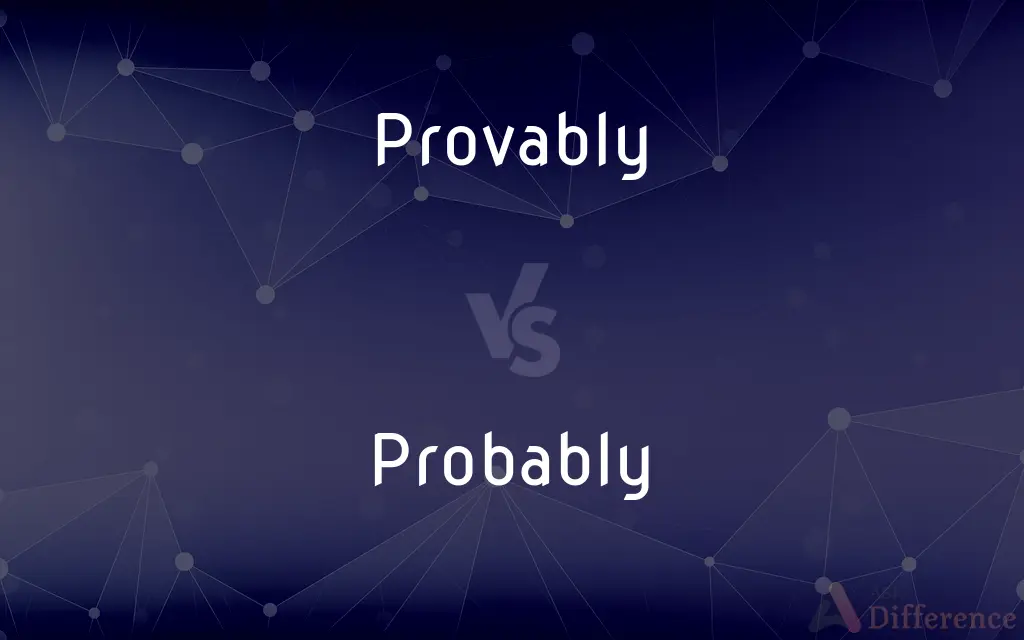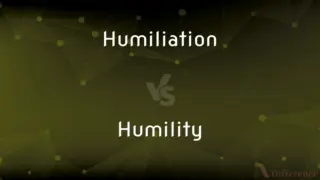Provably vs. Probably — What's the Difference?
By Tayyaba Rehman & Urooj Arif — Updated on March 31, 2024
Provably refers to something that can be demonstrated or verified with certainty, whereas probably denotes a high likelihood or chance of occurrence without certainty.

Difference Between Provably and Probably
Table of Contents
ADVERTISEMENT
Key Differences
Provably is used to describe situations or claims that can be proven or verified with evidence or logical reasoning, indicating certainty and an objective basis. Whereas probably suggests a high degree of likelihood or probability, but it falls short of absolute certainty, leaving room for doubt or alternative outcomes.
When discussing the validity of a statement, "provably" implies that there is concrete evidence or a methodological approach to confirm the truthfulness of the statement. On the other hand, "probably" is used when the evidence points towards a conclusion, but it is not definitive enough to confirm it beyond a reasonable doubt.
In mathematical or scientific contexts, "provably" is often used to denote that something can be demonstrated through a rigorous process of logical deduction or empirical evidence. Whereas, "probably" is used in situations where statistical or empirical evidence suggests a conclusion, but the conclusion cannot be guaranteed.
In everyday language, "provably" is less commonly used than "probably," reflecting the nature of most daily uncertainties that cannot be proven with absolute certainty. On the other hand, "probably" is a more versatile term that accommodates the nuances of everyday probability and the common acceptance of things not being entirely certain.
"Provably" is key in fields that rely on formal proofs, such as mathematics, logic, and computer science, emphasizing the importance of verifiable truth. In contrast, "probably" is widely used across various disciplines and in everyday language to express likelihoods and educated guesses, highlighting its flexibility and subjective nature.
ADVERTISEMENT
Comparison Chart
Definition
Capable of being proven or verified
Likely but not certain
Context of Use
Formal, scientific, mathematical
Informal, general, everyday conversation
Level of Certainty
Absolute certainty, verifiable truth
High likelihood, but lacks absolute certainty
Associated Fields
Mathematics, logic, computer science
General use, across various disciplines
Example Usage
"The theorem is provably correct."
"It will probably rain tomorrow."
Compare with Definitions
Provably
Subject to confirmation through empirical evidence.
The results are provably consistent with the theory.
Probably
Signifying a high degree of likelihood.
It's probably too late to start a new project.
Provably
Demonstrable through logical reasoning.
Within the system, the theorem is provably valid.
Probably
Suggesting a strong possibility but not certainty.
He is probably the best candidate for the job.
Provably
Certifiable in a scientific or mathematical context.
The algorithm is provably secure against attacks.
Probably
Used to express tentative judgment.
I'll probably go to the event if I finish work on time.
Provably
Capable of being proven as true or false.
The hypothesis was provably incorrect, disproven by the experiment.
Probably
Indicating an educated guess based on available information.
They are probably out for dinner, given the time.
Provably
Verifiable by evidence or argument.
The statement is provably true, based on the data collected.
Probably
Likely to happen or be the case.
She will probably arrive late due to traffic.
Provably
To establish the truth or validity of (something) by the presentation of argument or evidence
The novel proves that the essayist can write in more than one genre. The storm proved him to be wrong in his prediction.
Probably
Most likely; presumably.
Provably
To demonstrate the reality of (something)
He proved his strength by doing 50 pushups.
Probably
In all likelihood.
Provably
To show (oneself) to be what is specified or to have a certain characteristic
Proved herself to be a formidable debater.
Proved herself to be worthy of the task.
Probably
In a probable manner; in likelihood.
Distinguish between what may possibly and what will probably be done.
Provably
To establish by the required amount of evidence
Proved his case in court.
Probably
With considerable certainty; without much doubt;
He is probably out of the country
In all likelihood we are headed for war
Provably
To establish the authenticity of (a will).
Probably
Easy to believe on the basis of available evidence;
He talked plausibly before the committee
He will probably win the election
Provably
To demonstrate the validity of (a hypothesis or proposition).
Provably
To verify (the result of a calculation).
Provably
To subject (a gun, for instance) to a test.
Provably
(Printing) To make a sample impression of (type); proof.
Provably
(Archaic) To find out or learn (something) through experience.
Provably
To be shown to be such; turn out
A theory that proved impractical in practice.
A schedule that proved to be too demanding.
Provably
With proof; in a provable manner.
Provably
In an obvious and provable manner;
His documentary sources are demonstrably wrong
Common Curiosities
What does "probably" mean?
"Probably" means there is a high likelihood or chance of something happening or being true, but it's not certain.
What makes a claim "provably" false?
A claim is "provably" false if it can be shown to be incorrect through logical reasoning or empirical evidence.
Can you prove something is "probably" true?
You can provide evidence that suggests something is probably true, but by definition, "probably" lacks the absolute certainty of being provable.
Is "probably" used in scientific research?
"Probably" is used in scientific research to express likelihoods based on evidence, though conclusions are generally supported by data rather than absolute certainty.
What does "provably" mean?
"Provably" refers to something that can be demonstrated or verified with evidence or logical reasoning.
Can something be both provably and probably true?
Yes, in some contexts, something can be both provably and probably true, depending on the evidence and certainty level.
Why is "probably" more commonly used than "provably"?
"Probably" is more commonly used because it accommodates the nuances of everyday probability and situations where absolute certainty is rare.
Is "probably" a definite confirmation?
No, "probably" is not a definite confirmation; it indicates a high likelihood but not absolute certainty.
Can opinions be "provably" true?
Opinions, by nature, are subjective and cannot be "provably" true or false in the same way as factual claims.
How is "provably" used in mathematics?
In mathematics, "provably" is used to describe statements or theorems that can be demonstrated to be true through logical deduction.
What is the significance of proof in "provably"?
Proof is crucial in "provably," as it signifies the presence of evidence or reasoning that confirms something beyond doubt.
How do probabilities relate to "probably"?
Probabilities quantify the likelihood of an event occurring, which is the basis for describing something as "probably" happening.
What role does evidence play in something being "provably" correct?
Evidence is fundamental in making something "provably" correct, as it provides the basis for verification or proof.
What is the difference between "probably" and "possibly"?
"Probably" indicates a higher degree of likelihood than "possibly," which merely suggests that something could happen without implying a strong likelihood.
How do you determine if something is "probably" true?
Determining if something is "probably" true involves evaluating the available evidence and assessing the likelihood based on that evidence.
Share Your Discovery

Previous Comparison
Humiliation vs. Humility
Next Comparison
Pentateuch vs. TorahAuthor Spotlight
Written by
Tayyaba RehmanTayyaba Rehman is a distinguished writer, currently serving as a primary contributor to askdifference.com. As a researcher in semantics and etymology, Tayyaba's passion for the complexity of languages and their distinctions has found a perfect home on the platform. Tayyaba delves into the intricacies of language, distinguishing between commonly confused words and phrases, thereby providing clarity for readers worldwide.
Co-written by
Urooj ArifUrooj is a skilled content writer at Ask Difference, known for her exceptional ability to simplify complex topics into engaging and informative content. With a passion for research and a flair for clear, concise writing, she consistently delivers articles that resonate with our diverse audience.
















































